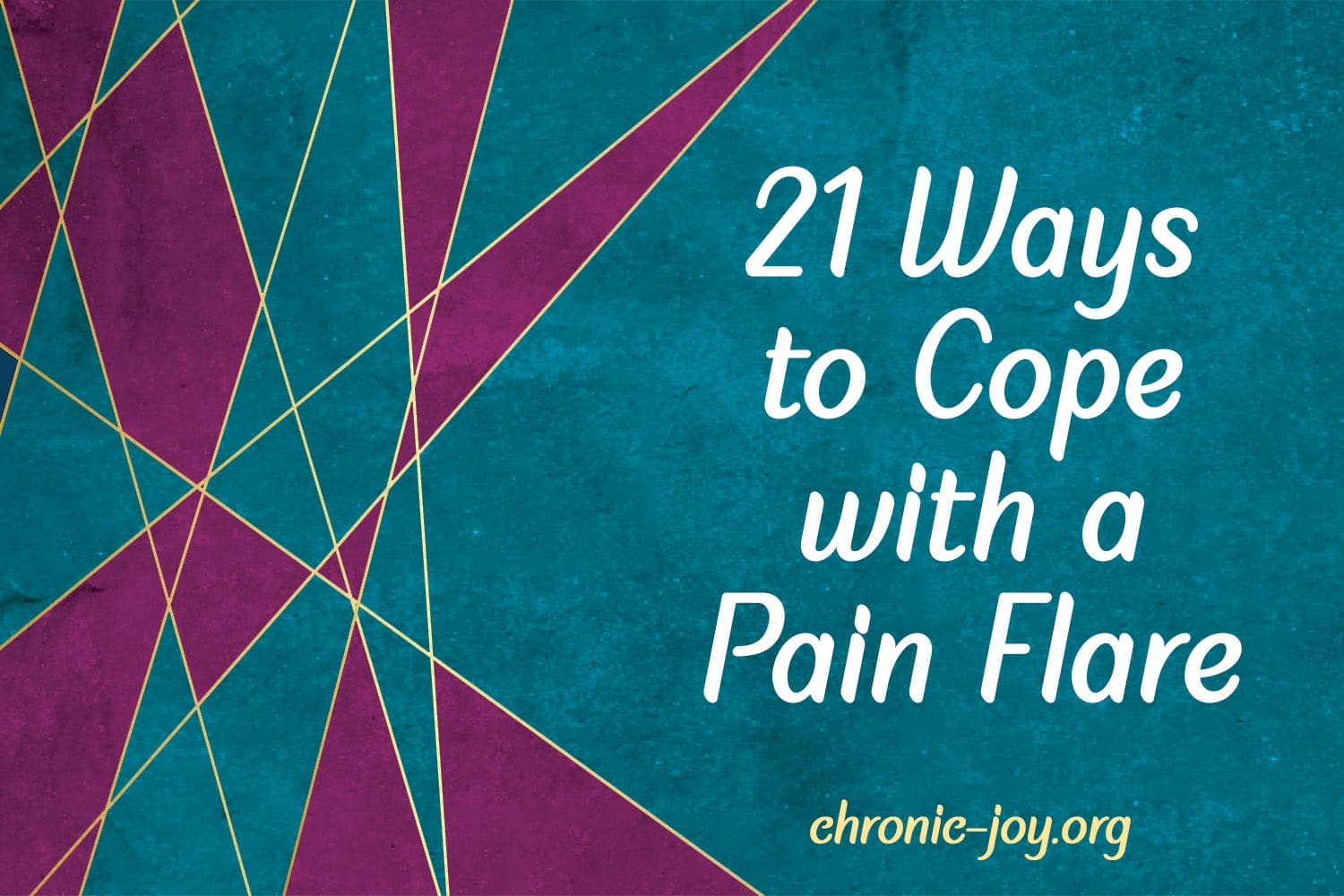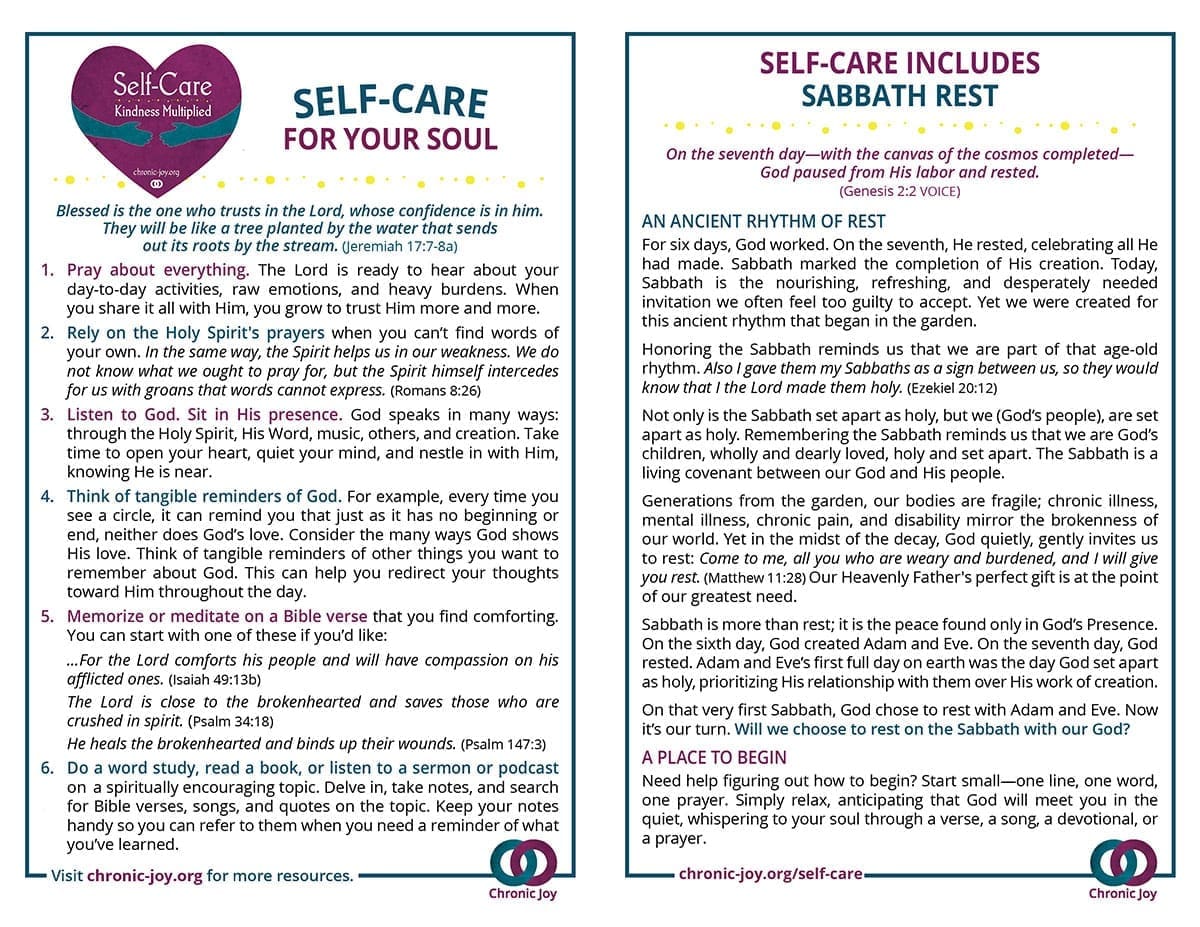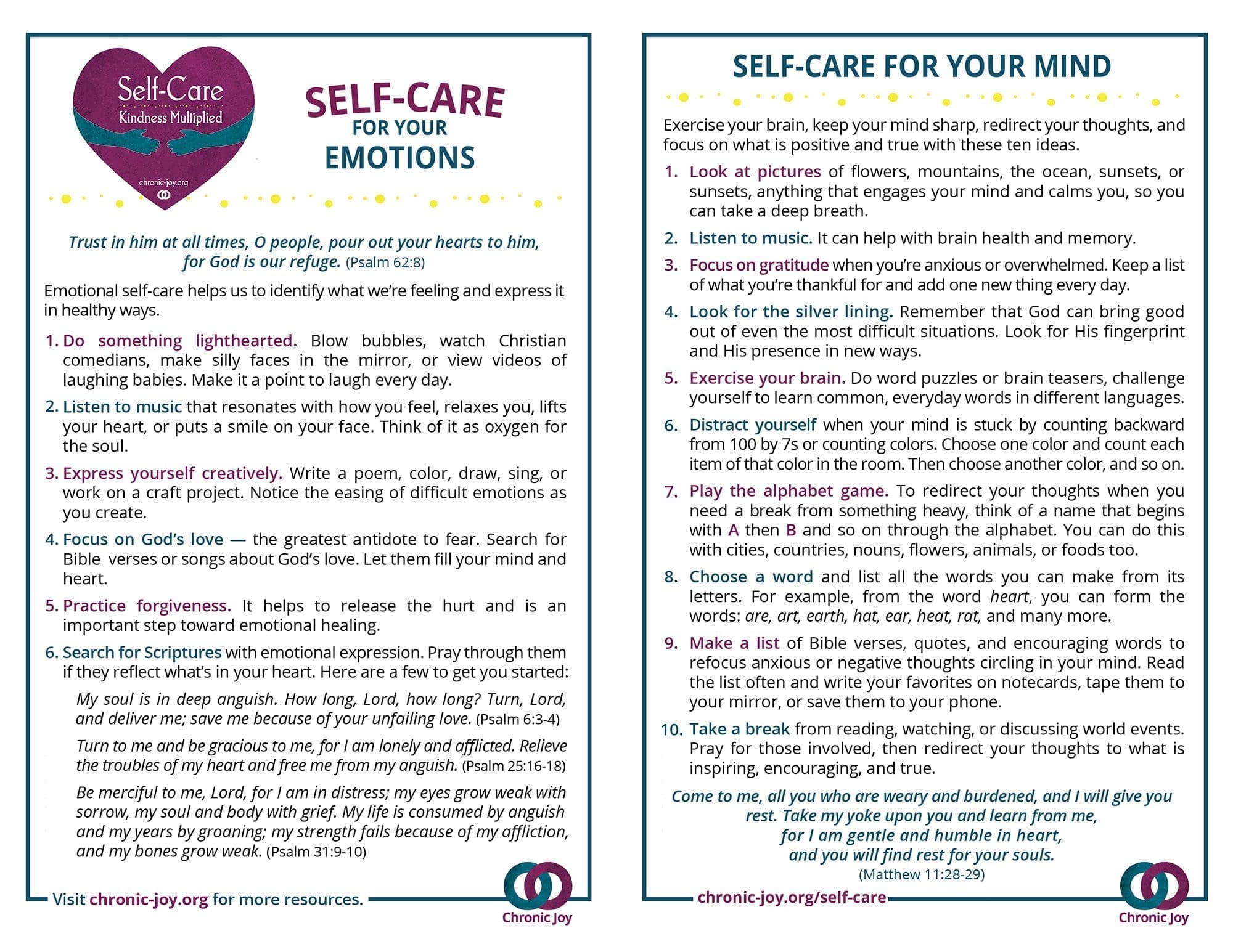
21 Ways to Cope with a Pain Flare
CHRONIC PAIN FLARES ARE HARD. Practice these 21 strategies to make them just a little easier.
1. Get the Grief Out.
Have a good cry. Let yourself be sad. Don’t put on a positive act right at the beginning. It is normal and healthy to feel upset when bad things happen. Find ways to get the grief out by journaling, talking, creating art, listening to music, and allowing yourself to feel whatever you feel.
2. Make a Plan.
You need a practical and solid plan. The best way to create one is to write it down. What steps do you need to take over the following days and weeks? What reasonable and helpful goals can you set for yourself—or what do you need to avoid?
3. Set Boundaries and Reduce your Schedule.
Pain flare-ups require rest. There is no way around this. Finding time to rest requires reducing your schedule and setting strict boundaries on what you will and will not do for a while. Cancel plans. Take a day off. Ask someone to take over one responsibility. Let the house get dirty. Do whatever it takes to get some extra rest. Say no, and don’t feel guilty. Take a pacing class to learn how to better balance between movement and rest.
4. Improve the Moment.
Continually ask yourself, What will make this moment better? Ice? Heat? A bath? A meal? Massage? Rest? Walk? Hydrating? Stretching? Reaching out to a friend? Taking pain meds? As much as you can, don’t sit in your misery when you can do something, no matter how small.
5. Be Honest About What You Need.
Asking for help is important. Instead of pretending you are fine or not telling anyone about your increase in pain, have an honest discussion with the people close to you. Let them know if you need help with tasks you typically do. Be honest about what you absolutely can’t do for a while.
6. Shut Down Guilt and Regret.
Those thoughts that the flare-up is your fault and that you could have avoided it if you had done x, y, or z? Shut them down. It’s not your fault. Your body is wonky. It does what it wants when it wants. While you do have a measure of control over your health, for many people, flare-ups are simply unavoidable.
7. Rework Your Expectations.
Expect less out of yourself and from life for a while. Accept that things will be a little harder for the time being.
8. Talk Yourself Down.
Tell yourself the truth about your situation. Avoid spiraling into untrue and unhelpful thoughts. Flare-ups pass. You have done this before, and you can do it again. You will not always feel this emotionally bent out of shape. Your body is strong and able to withstand high levels of pain. You can and will make it through each hard moment.
9. Distract Yourself.
As much as you are able, take a break from the pain through distraction. Read a book. Watch a mindless TV show. Read articles online. Snuggle a puppy. Listen to a podcast. Take pictures with your phone. Work on a craft or some form of art. Try contemplative coloring.
10. Consider the Big Picture.
Take a moment to see the big picture. What is God doing? How is He working? How has He shown up in the past? What is your hope? What good things is He providing right next to the hard things?
11. Don’t Stop Moving Completely.
Rest is essential, but it’s also important not to stop moving altogether. Do some gentle stretching. Walk down the hall. Sit outside. Do a little tai chi or yoga. Know your body well enough to know what it can handle.
12. Do Your Best Not to Isolate.
Some level of isolation may be inevitable in a bad pain flare, but do what you can to limit it. Text a friend. Engage on Facebook. Ask someone to visit. Talk to someone on the phone. Go out if and when you can.
13. Talk to Friends Who Experience Pain.
Even better than talking to people in general is talking to other people who experience pain. Vent away to someone who completely understands. Join a community of people with chronic illness and pain.
14. Pray.
Pray a lot. Talk to God about what you are going through. Ask questions. Share your pain. Thank Him for the good things He has given you. Confess sins. Ask forgiveness (not because your pain results from sin, just because this is a good thing to do). Wrestle with God’s plan for your life. Find comfort in His presence.
15. Practice Relaxation Strategies.
Relaxing your body is important when you are in pain. Tense muscles can prolong a flare-up. Practice deep breathing, listen to guided visualization, meditate, get a massage, or take a bath. Look up progressive muscle relaxation and give it a try.
16. Remember Basic Self-Care.
Have you eaten today? Have you had enough water today? Would you feel better if you changed into clean clothes? Do you need to brush your teeth? Take a shower? If you can’t shower or bathe, could you use a washcloth to get a little cleaner? Did you remember to take your meds?
17. Engage Your Senses.
Engaging your senses can be a form of relaxation and also a means of distracting from the pain. Smell some essential oils. Eat a piece of chocolate. Listen to music. Touch a cold and smooth stone or a fuzzy pillow. Sleep under a weighted blanket.
18. Use an Online Counseling Service.
Many online counseling and support services are available either for free or for a small price. Search for online counseling and see what you find.
19. Practice Gratitude.
Make a list of the good things God has given you. Be on the lookout for things that bring you joy. Purposefully add pleasurable things to your day.
20. Do Something Nice for Someone Else.
It can help to take the focus off of yourself and onto the people around you. Write a letter or card. Knit someone a scarf. Make your family member a cup of tea. Listen to a friend who is going through a hard time.
21. Try Something New.
Trying a new pain management technique can bring a measure of hope. Try that supplement, vitamin, essential oil, or gadget you have considered. Make an appointment with a new specialist. Ask your doctor if there is a next step to take. Read a book on pain management to get ideas.
What about you? What helps you cope with flares?
First published at Life in Slow Motion on July 3, 2018. Published with permission.


Esther Smith
Esther is a licensed biblical counselor who writes about her experience with chronic pain. She uses her website to encourage people facing physical and mental illness challenges. She is the author of Chronic Illness: Walking by Faith, But God, Wouldn’t I Be More Useful to You If I Were Healthy?, When Chronic Pain and Illness Take Everything Away, and The Whole Life: 52 Weeks of Biblical Self-Care. Esther and her husband, Ian, live in Baltimore, Maryland, with their dogs, Bella and Bug.

Self-Care for your Soul
Spend a little time getting to know God better: who He is, what He’s like, how He feels about us, and how He acts toward His creation. Sabbath rest helps us discover the peace only found when we trust in God's presence.

Self-Care for your Emotions & Mind
Exercise your brain, keep your mind sharp, redirect your thoughts, and focus on what is positive and true with these ideas. Emotional self-care helps us identify what we’re feeling and how to express it in healthy ways.

Recent Comments